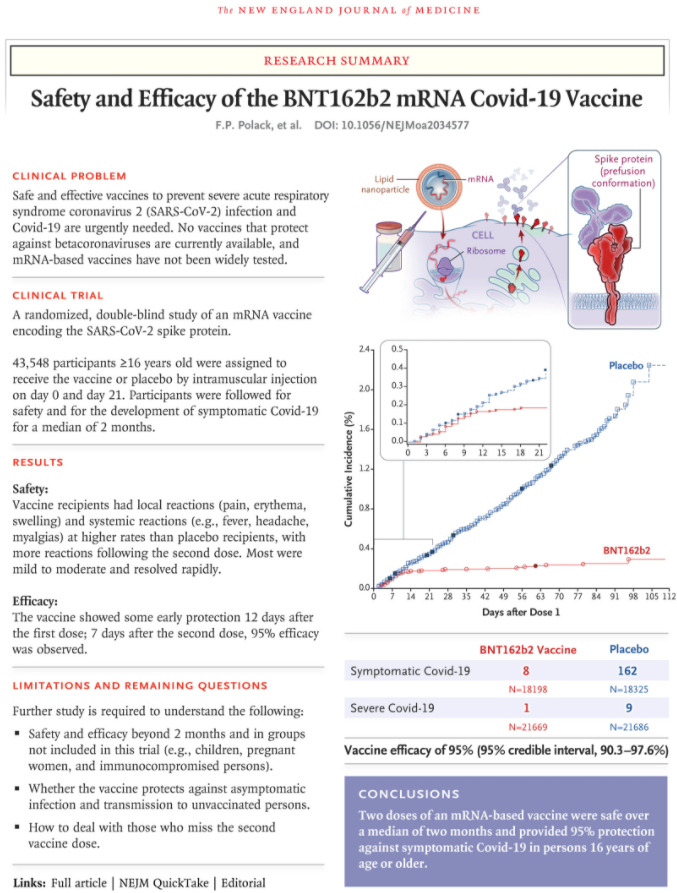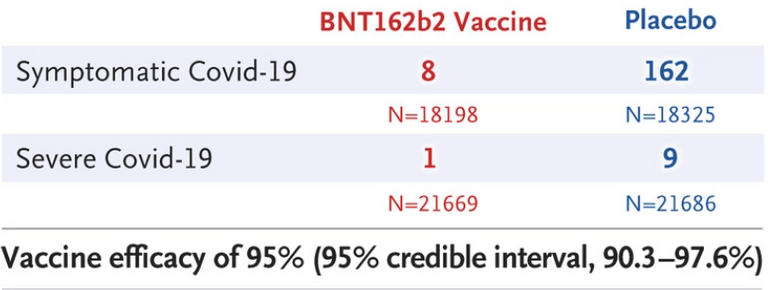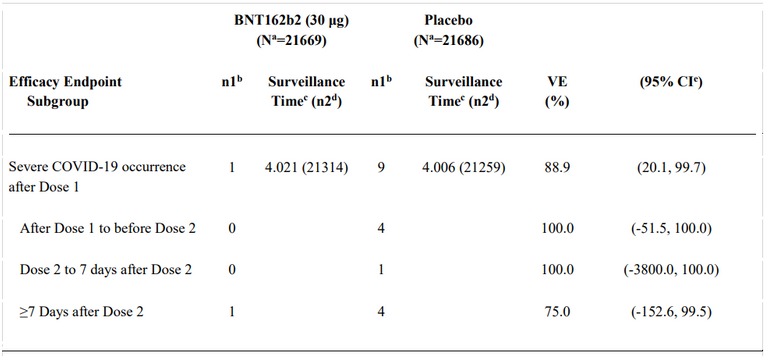Dear All,
recently the data of the pivotal study of the Pfizer-Biontech vaccine was published in the New England Journal of Medicine with the title "Safety and Efficacy of the BNT162b2 mRNA Covid-19 Vaccine“ (in the following called "the paper"). There was quite some fraud committed with significant impact on the outcome and interpretation of the data!
Severe Covid-19 cases
In the paper the authors wrote „Of the 10 cases of severe COVID-19 that were observed after the first dose, only 1 occurred in the vaccine group."
This is factually correct, but a violation of the protocol. In the protocol it is clearly stated that evaluation of the efficacy of the vaccine against severe COVID-19 cases is to be done "at least 7 days" after the second dose, and not directly after the first dose:

src
This has a good reason, as only by then a case (or lack of a case) might be a consequence of the dosing regime for which the license is seeked. A case e.g. 2 days after the first dose might be pure coincidence, as no immunization is likely that early.
So why didn´t the authors state the values from the correct time frame? Because in that case the numbers would not look that nice anymore!
Summary page of the publication:

src
As you can see in the graph, several severe cases of the placebo group (the filled blue dots) happened already quite early, prior to the correct evaluation phase (after 7 days after the 2nd dose = day 28) and would have been lost, if the protocol would have been adhered to. By losing those cases, the distribution of cases in the vaccine/placebo group would be not the 9 to 1 like published on page 1

src
but only 4 to 1 like stated in a table further down in the paper:

src
9/1 and 4/1 is a huge difference! Remember, this is about the severe cases. Only those are relevant, because why would someone get a shot with unknown long term side effects just to prevent a mild disease? Protection from severe cases is the proof of the pudding, so they added those cases despite not allowed per protocol, to rescue their efficacy!
As you also can see as well, unlike stated in the protocol, the data from after 14 days of dose 2 are not even shown! Another protocol violation, probably because then another severe case from the placebo group would have not been allowed to be counted and the proportion would shrink to 3 to 1!
Exactly to prevent such fraud it is best practice and an absolut must in any scientific paper, that what is stated in the protocol is 100% reflecting what you do later in the analysis. Otherwise you could analyse later just what gives a favorable outcome and ignore any findings which are unfavorable. Just as if you first shoot and then draw the target around the bullet hole - it guarantees that you will have hit the bull´s eye! In science this is an absolute no-go and it is revealing that in this paper it was needed to do such trickery!
As depicted in the table, the 95%-confidence interval of the values from 7 days after dose 2 is ranging from -152,6 to 99.5 (it means with 95% probability the (unknown) true value lies within these borders)! This shows that the VE (the vaccine efficacy = how many % protection the vaccine gives you) is in fact not significant at all, as the true value could be from less than 0% until up to 99,5%! Less than 0 would mean that the placebo works better. So it becomes clear why the authors didn´t put these numbers on the summary page, but this is fraudulent and highly misleading!
The table from the summary page shows also something different: From 162 COVID-19 cases in the placebo group, 4 (>=7 days after dose 2) were severe which is 2,5%. In the vaccine treated group there were only 8 cases of COVID-19, but one of them was severe which is 12,5%, a five-fold higher ratio! But one shall not calculate %ages from %ages. So I won´t exploit this number. Just concerning that from theses few cases, such a high number of 12,5% was severe! It should have been 0, if the vaccine is really that effective (see later)!
By the way, the occurrences of COVID-19 in the study was largely based on the same flawed hyper-sensitive RT-PCR-tests like used everywhere else, without any serology done or without excluding other infections like influenza. But this trickery is not really surprising, given the worldwide abuse of PCR-testing as the exclusive disease diagnostic tool.
More Misinformation
So how high is the protection of the vaccine now in reality?
In a press release from Pfizer about this study it is stated boldly that the vaccine was 95% effective against COVID-19:
src
Also in (German) information leaflets which are now handed out to the test subjects people to be vaccinated, it is stated that 95 from 100 vaccinated persons are protected:

src
They conclude it from the fact that in the vaccine group only 8 COVID-19 cases have occurred >=7 days after the second dose, vs. 162 with the placebo: 100-(8/162)*100 = 95%. This number is completely wrong and misleading. In reality not 95%, but only 154 from 21728 = 0,7% are protected. Why? Because also in the placebo group only 162 COVID-19 cases have occurred among 21686 participants >=7 days after the second dose while >99% of them stayed healthy. So one could also state that the placebo protected >99% of patients!
To correctly calculate the vaccine efficacy, one has to look at how many less cases were observed in the vaccine group compared to the placebo group. So 162-8=154 cases less have occurred. Thus 154 from 21728 participants = 0,7% were protected from COVID-19!
It is the very small overall incidence of COVID-19 (unlike a pandemic situation!) in that study that leads to the conclusion that you need to vaccinate >100 sheeple in order to protect one of them!
But, like with the PCR-tests, I am sure these findings will not be taken up by the mass media. The mass vaccinations have started, the propaganda and desinformation campaingns all settled and swallowed by the masses, there is no way back.
What we don´t know
Despite people are already being vacinated in large scale we still don´t know
- if the immunization last longer than 8 weeks
- if the vaccine protects children, pregnant women or immunocompromised people
- if it protects against asymptomatic infections and transmission to unvaccinated persons
- if it protects against severe cases of COVID-19
I don´t say the vaccine has no effect, I just doubt we have enough efficacy (and safety!) data to test this drug on millions of mostly healthy people! And the fact that the data were obviously misinterpreted but nevertheless were good enough for the Health Authorities to rush the license, is quite disturbing!
We will only learn the hard way, if at the end of the day (if at all) the benefit/risk ratio of the vaccines will be positive....
Sources:
https://www.nejm.org/doi/full/10.1056/NEJMoa2034577
https://reitschuster.de/post/impfstoff-betrug-im-kleingedruckten/
See also my previous post:
COVID-19 vaccination - is it worth it?
EDIT Sep. 2023:
A new study has summed up a part of the fraud that Pfizer has been done and revealed that already in 2020 Pfizer must have been aware about the cardiovascular side effects, but swept them under the carpet:
https://www.preprints.org/manuscript/202309.0131/v1


Excellent text, @stayoutoftherz. You might also put in the sources FDA Briefing Document and its findings on ‘safety’:
https://www.fda.gov/media/144245/download
Ich interpretiere die Grafik so, dass bereits nach 7-10 Tagen nach der 1. Dosis ein Impfschutz besteht. Das ist ziemlich cool und bei der Größe der Impfgruppen auch statistisch signifikant. In den ersten Tagen könnte die Ansteckung auch bereits vor der Impfung erfolgt sein. Warum soll man die verhinderten Fälle zwischen erster und zweiter Impfung nicht berücksichtigen?
I interpret the graph that there is already a protection by the vaccine after 7-10 days after the 1st dose. That's pretty cool and statistically significant given the size of the study groups. In the first few days, the infection could also have occurred before vaccination. Why not take into account the prevented cases between the first and second dose?
Yes, to prevent mild cases the vaccine demonstrated efficacy. But who needs to take the risk of this drug with a yet unexplored safety profile, just to prevent a mild flu-like diseass?
For severe cases there was no proof yet, per protocol, for efficacy. It is not scientifically sound to say "but it might work" if you don´t adhere to the analysis you have committed to initially.
And regarding the 7 days, so you would then also take only one shot, if that "seems to work as well"? Some might take one, others 2. This will create a chaos. Either the correct dose regime or nothing at all. I still prefer 0 doses, I don´t want to mess up my immune system for nothing.
Quickly forgiven, but not forgotten! I remember reading about a study mentioned in Wendy Lydall's Raising a Vaccine Free Child vaccinefreechild.com that deliberately took severe damage at 7 days after vaccination as being without coherence to the vaccine.
I found here through @lighteye's bi-lingual article(https://peakd.com/hive-122315/@lighteye/vaccine-no-thank-you-eng-srp-vakcina-ne-khvala).
!BEER !invest_vote
@andrepol denkt du hast ein Vote durch @investinthefutur verdient!
@andrepol thinks you have earned a vote of @investinthefutur !
View or trade
BEER.Hey @stayoutoftherz, here is a little bit of
BEERfrom @andrepol for you. Enjoy it!Learn how to earn FREE BEER each day by staking your
BEER.Bitte sag mir, dass ich das falsch verstanden habe: "„Of the 10 cases of severe COVID-19 that were observed after the first dose, only 1 occurred in the vaccine group."
Von 10 schweren Covid19-Fällen war nur einer in der Impfgruppe (der also geimpft wurde und kein Placebo erhielt)
??
Ja, das stimmt. Die Mehrheit der Fälle war in der Gruppe, die nicht geimpft war. Aber, wenn man die frühen Fälle vor Tag 28 weglässt, wie lt. Protokoll vorgeschrieben, reicht der Unterschied nicht mehr für eine klinische Signifikanz.
Du wurdest als Member von @investinthefutur gevotet!
Dazu noch ein kleines !BEER & VOIN-Token
Excelent
View or trade
BEER.Hey @stayoutoftherz, here is a little bit of
BEERfrom @investinthefutur for you. Enjoy it!Learn how to earn FREE BEER each day by staking your
BEER.